 W
WThe Akazu was an informal organization of Hutu extremists whose members contributed strongly to the 1994 Rwandan genocide. A circle of relatives and close friends of Rwanda's then-president Juvénal Habyarimana and his influential wife Agathe Habyarimana, they were also called the "Zero Network", for their goal of a Rwanda with zero Tutsi.
 W
WBoutros Boutros-Ghali was an Egyptian politician and diplomat who was the sixth Secretary-General of the United Nations (UN) from January 1992 to December 1996. An academic and former Vice Foreign Minister of Egypt, Boutros-Ghali oversaw the UN over a period coinciding with several world crises, including the breakup of Yugoslavia and the Rwandan genocide. He went on to serve as the first Secretary-General of the Organisation internationale de la Francophonie from 16 November 1997 to 31 December 2002.
 W
WJean-Louis Bruguière was the leading French investigating magistrate in charge of counter-terrorism affairs. He was appointed in 2004 vice-president of the Paris Court of Serious Claims. He has garnered controversy for various acts, including the indictment of Rwandan president Paul Kagame for the assassination in 1994 of Juvenal Habyarimana. Washington Post journalist Dana Priest has cited him as saying that he had in the past ordered the arrest of more than 500 suspects, some with the assistance of US authorities. According to the investigative reporter, who described the workings of Alliance Base, a CTIC joint counter-terrorist operations center, involving the DGSE, the CIA and other foreign intelligence agencies, Bruguière declared that "[he had] good connections with the CIA and FBI." Bruguière has since temporarily left his judicial functions to dedicate himself to politics, joining Nicolas Sarkozy's Union for a Popular Movement (UMP) conservative party. However, he was appointed by the European Union at the US Department of Treasury to oversee the Terrorist Finance Tracking Program.
 W
WRoméo Antonius Dallaire, is a Canadian humanitarian, author, and retired senator and Lieutenant-General. Dallaire served as Force Commander of UNAMIR, the ill-fated United Nations peacekeeping force for Rwanda between 1993 and 1994, and attempted to stop the genocide that was being waged by Hutu extremists against the Tutsi people and Hutu moderates.
 W
WAlison Des Forges was an American historian and human rights activist who specialized in the African Great Lakes region, particularly the 1994 Rwandan genocide. At the time of her death, she was a senior advisor for the African continent at Human Rights Watch. She died in a plane crash on 12 February 2009.
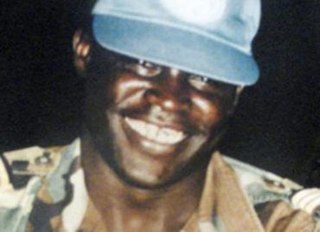 W
WMbaye Diagne was a Senegalese military officer who served in Rwanda as a United Nations military observer from 1993 to 1994. During the Rwandan genocide he undertook many missions on his own initiative to save the lives of civilians.
 W
WGénocidaires are those guilty of the mass killings of the 1994 Rwandan genocide, in which close to a million Rwandans, primarily Tutsis, were murdered by their Hutu neighbors. In the aftermath of the genocide, those guilty of organizing and leading the genocide were put on trial at the International Criminal Tribunal for Rwanda. Those guilty of lesser crimes—participation, profiting through seizing Tutsi property, etc.—were put on trial in gacaca courts.
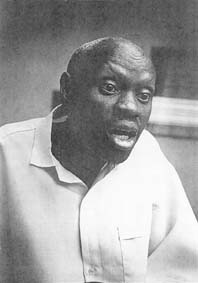 W
WNoël (Noheli) Hitimana was a presenter (animateur) on the Rwandan radio station Radio Télévision Libre des Mille Collines (RTLM), which played a significant role in promoting the genocide against the Tutsi. Like the station's other broadcasters, Hitimana incited violence against Tutsi on the air.
 W
WImmaculée Ilibagiza is a Rwandan American author and motivational speaker. Her first book, Left to Tell: Discovering God Amidst the Rwandan Holocaust (2006), is an autobiographical work detailing how she survived during the Rwandan genocide. She was featured on one of Wayne Dyer's PBS programs, and also on a December 3, 2006 segment of 60 Minutes.
 W
WFélicien Kabuga is a Rwandan businessman who is charged for his involvement in the Rwandan genocide.
 W
WPaul Kagame is a Rwandan politician and former military leader. He is the 6th and current President of Rwanda, having taken office in 2000 when his predecessor, Pasteur Bizimungu, resigned. Kagame previously commanded the Rwandan Patriotic Front, the Uganda-based rebel force that invaded Rwanda and was one of the parties of the conflict during the Rwandan genocide. He was considered Rwanda's de facto leader when he served as Vice President and Minister of Defence from 1994 to 2000. He was re-elected in August 2017 with an official result of nearly 99% in an election criticized for numerous irregularities. He has been described as the "most impressive" and "among the most repressive" African leaders.
 W
WFroduald Karamira was a Rwandan politician who was found guilty of crimes in organising the implementation of the 1994 Rwandan genocide. He was sentenced to death by a Rwandan court and was one of the last 24 individuals executed by Rwanda.
 W
WColonel Luc Marchal is a retired officer of the armed forces of Belgium. He is known for being the senior officer in the Belgian peacekeeping contingent during the 1994 Rwandan genocide, as well as the United Nations Assistance Mission for Rwanda (UNAMIR) sector commander for the capital Kigali.
 W
WFrançois Maurice Adrien Marie Mitterrand was a French statesman who served as President of France from 1981 to 1995, the longest time in office in the history of France. As First Secretary of the Socialist Party, he was the first left-wing politician to assume the presidency under the Fifth Republic.
 W
WMobutu Sese Seko Kuku Ngbendu Wa Za Banga was a Congolese politician and military officer who was the President of the Democratic Republic of the Congo and later Zaire from 1965 to 1997. He also served as Chairman of the Organisation of African Unity from 1967 to 1968. During the Congo Crisis, Mobutu, serving as Chief of Staff of the Army and supported by Belgium and the United States, deposed the democratically elected government of nationalist Patrice Lumumba in 1960. Mobutu installed a government that arranged for Lumumba's execution in 1961, and continued to lead the country's armed forces until he took power directly in a second coup in 1965 to become the country's military dictator.
 W
WIgnace Murwanashyaka was a leader of the Democratic Forces for the Liberation of Rwanda (FDLR), a Rwandan Hutu rebel group that absorbed a number of military people responsible for the Rwanda genocide, and operating in the Democratic Republic of the Congo. The FDLR are responsible for large scale human rights violations and crimes against humanity, including rape on a massive scale.
 W
WGrégoire Ndahimana is the former mayor of Kivumu, Rwanda. Indicted and arrested for alleged war crimes by the International Criminal Tribunal for Rwanda (ICTR), Ndahimana is thought to be one of the key figures in the 1994 Rwandan genocide, and is claimed to have had up to 6,000 Tutsi killed. He will stand trial in Arusha, Tanzania, where the ICTR currently holds its courts.
 W
WPauline Nyiramasuhuko is a Rwandan politician who was the Minister for Family Welfare and the Advancement of Women. She was convicted of having incited troops and militia to carry out rape during the Rwandan genocide of 1994. She was tried for genocide and incitement to rape as part of the "Butare Group" at the International Criminal Tribunal for Rwanda (ICTR) in Arusha, Tanzania. In June 2011, she was convicted of seven charges and sentenced to life imprisonment. Nyiramasuhuko is the first woman to be convicted of genocide by the ICTR, and the first woman to be convicted of genocidal rape.
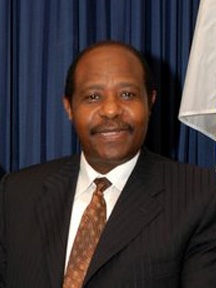 W
WPaul Rusesabagina is a Rwandan humanitarian and activist who, while working as a manager at the Hôtel des Mille Collines in Kigali, hid and protected 1,268 Hutu and Tutsi refugees from the Interahamwe militia during the Rwandan genocide. None of these refugees were hurt or killed during the attacks.
 W
WTatiana Rusesabagina is a Rwandan who, with her husband Paul Rusesabagina, survived in Hôtel des Mille Collines during the 1994 Rwandan genocide, and saved over a thousand people from being murdered. This story was used as the basis for the 2004 film Hotel Rwanda, in which Tatiana was portrayed by Sophie Okonedo, who was nominated for an Academy Award for Best Supporting Actress for her performance as Tatiana.
 W
WPascal Simbikangwa is the former spy chief of Rwanda. Simbikangwa was an active propagandist during the Rwandan genocide in 1994 and was found guilty of crimes against humanity.
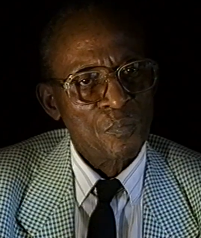 W
WThéodore Sindikubwabo was the interim President of Rwanda during the Rwandan genocide, from April 9 to July 19, 1994. Prior to that he was President of the National Development Council 1988–1994.
 W
WFaustin Twagiramungu is a Rwandan politician. He was Prime Minister from 1994 until his resignation in 1995, the first head of government appointed after the Rwandan Patriotic Front (RPF) captured Kigali. He then exiled himself to Belgium.
 W
WClemantine Wamariya is a Rwandan-American author, speaker, and human rights activist.
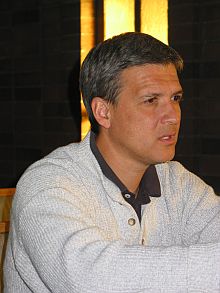 W
WCarl Wilkens is an American Christian missionary and the former head of the Adventist Development and Relief Agency International in Rwanda. In 1994, he was the only American who chose to remain in the country after the Rwandan genocide began.